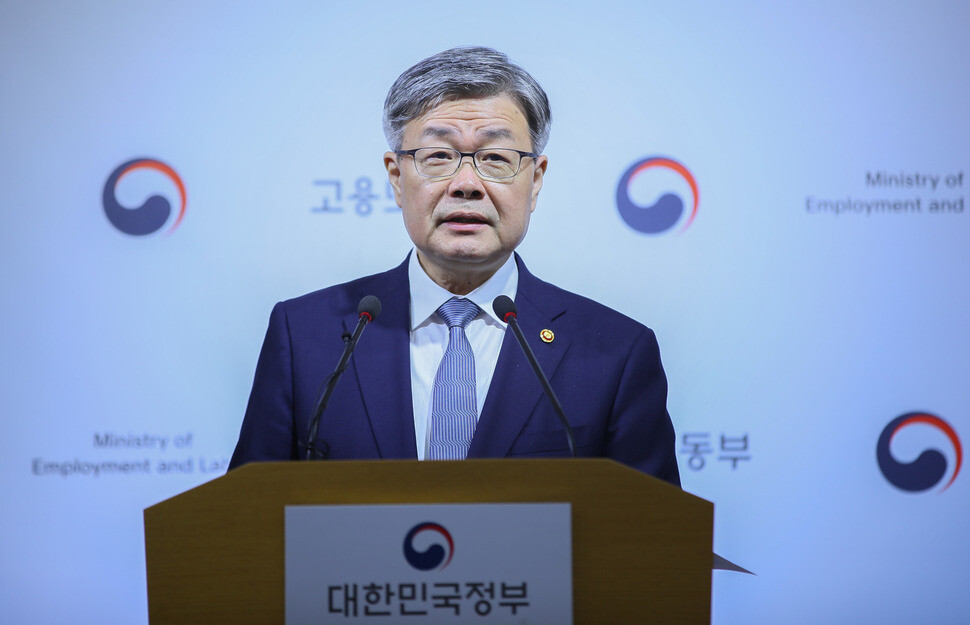hankyoreh
Links to other country sites 다른 나라 사이트 링크
S. Korea to ratify ILO conventions and amend related laws simultaneously

The South Korean government has decided to initiate procedures to ratify key International Labour Organization (ILO) conventions – concerning freedom of association the prohibition of forced labor -- while simultaneously revising related legislation in a regular session of the National Assembly.
In a briefing at the Central Government Complex in Seoul on May 22, Minister of Employment and Labor Lee Jae-gab announced, “This year the South Korean government will make preparations so that ratification procedures for the three core [ILO] conventions can be discussed simultaneously with amendments of related acts.” This marked a reversion of the government’s former “legislation first, ratification second” stance, based on the idea that current South Korean laws conflicting with the conventions made legislative procedures necessary before ratification. The government has now announced its intentions to pursue legislation and ratification at the same time.
There are a total of eight core ILO conventions; South Korea has yet to ratify conventions No. 87 and No. 98, which concern freedom of association, and No. 29 and No. 105, which concern the abolition of forced labor. President Moon included ratification as part of his campaign promise as well as his five-year governance plan. In September 2017, Moon also promised ILO Director General Guy Ryder during the latter’s visit to Korea that he would ratify the conventions. The South Korean government, however, opted for a “legislation first, ratification second” method that sought to amend related laws such as the Trade Union Act, the Act on the Establishment and Operation of Teachers’ Unions, and the Act on the Establishment and Operation of Public Officials’ Unions before initiating ratification procedures. This path prompted harsh criticism from the labor community and civic society.
”Although [the South Korean government] has searched for ways for social reconciliation and cooperation Economic, Social, and Labor Council [ESLC] has concluded its deliberations on the matter [after failing to reach a consensus],” adding, “We’ve decided to pursue ratification of conventions No. 87 and No 98, which concern freedom of association, and No. 29, which concerns the abolition of forced labor, as well as the submission of legal amendments in the regular session of the National Assembly via cooperation with relevant ministries and opinion canvassing among labor and management.
“We plan on forming a comprehensive plan for ratifying the freedom of association convention as well as amending related laws by gathering opinions from the ESLC’s public interest committee and various communities and social classes,” Lee said.
However, regarding convention No. 105, Lee said, “additional review is required, considering South Korea’s criminal law and the division of the Korean Peninsula.” Convention no. 105 prohibits the suppression and reeducation of political prisoners, the mobilization of labor in the name of national economic development, and compulsory labor via labor regulations, which substantially conflicts with South Korea’s current laws concerning national security and the right to assembly.
By Cho Hye-jeong, staff reporter
Please direct comments or questions to [english@hani.co.kr]

Editorial・opinion
![[Column] Park Geun-hye déjà vu in Yoon Suk-yeol [Column] Park Geun-hye déjà vu in Yoon Suk-yeol](https://flexible.img.hani.co.kr/flexible/normal/500/300/imgdb/original/2024/0424/651713945113788.jpg) [Column] Park Geun-hye déjà vu in Yoon Suk-yeol
[Column] Park Geun-hye déjà vu in Yoon Suk-yeol![[Editorial] New weight of N. Korea’s nuclear threats makes dialogue all the more urgent [Editorial] New weight of N. Korea’s nuclear threats makes dialogue all the more urgent](https://flexible.img.hani.co.kr/flexible/normal/500/300/imgdb/original/2024/0424/7317139454662664.jpg) [Editorial] New weight of N. Korea’s nuclear threats makes dialogue all the more urgent
[Editorial] New weight of N. Korea’s nuclear threats makes dialogue all the more urgent- [Guest essay] The real reason Korea’s new right wants to dub Rhee a founding father
- [Column] ‘Choson’: Is it time we start referring to N. Korea in its own terms?
- [Editorial] Japan’s rewriting of history with Korea has gone too far
- [Column] The president’s questionable capacity for dialogue
- [Column] Are chaebol firms just pizza pies for families to divvy up as they please?
- [Column] Has Korea, too, crossed the Rubicon on China?
- [Correspondent’s column] In Japan’s alliance with US, echoes of its past alliances with UK
- [Editorial] Does Yoon think the Korean public is wrong?
Most viewed articles
- 1‘We must say no’: Seoul defense chief on Korean, USFK involvement in hypothetical Taiwan crisis
- 2N. Korean delegation’s trip to Iran shows how Pyongyang is leveraging ties with Moscow
- 346% of cases of violence against women in Korea perpetrated by intimate partner, study finds
- 4[Column] Park Geun-hye déjà vu in Yoon Suk-yeol
- 5‘Weddingflation’ breaks the bank for Korean couples-to-be
- 6Will NewJeans end up collateral damage in internal feud at K-pop juggernaut Hybe?
- 7Amnesty notes ‘erosion’ of freedom of expression in Korea in annual human rights report
- 8[Interview] Dear Korean men, It’s OK to admit you’re not always strong
- 9Korean government’s compromise plan for medical reform swiftly rejected by doctors
- 10[Editorial] Japan’s rewriting of history with Korea has gone too far